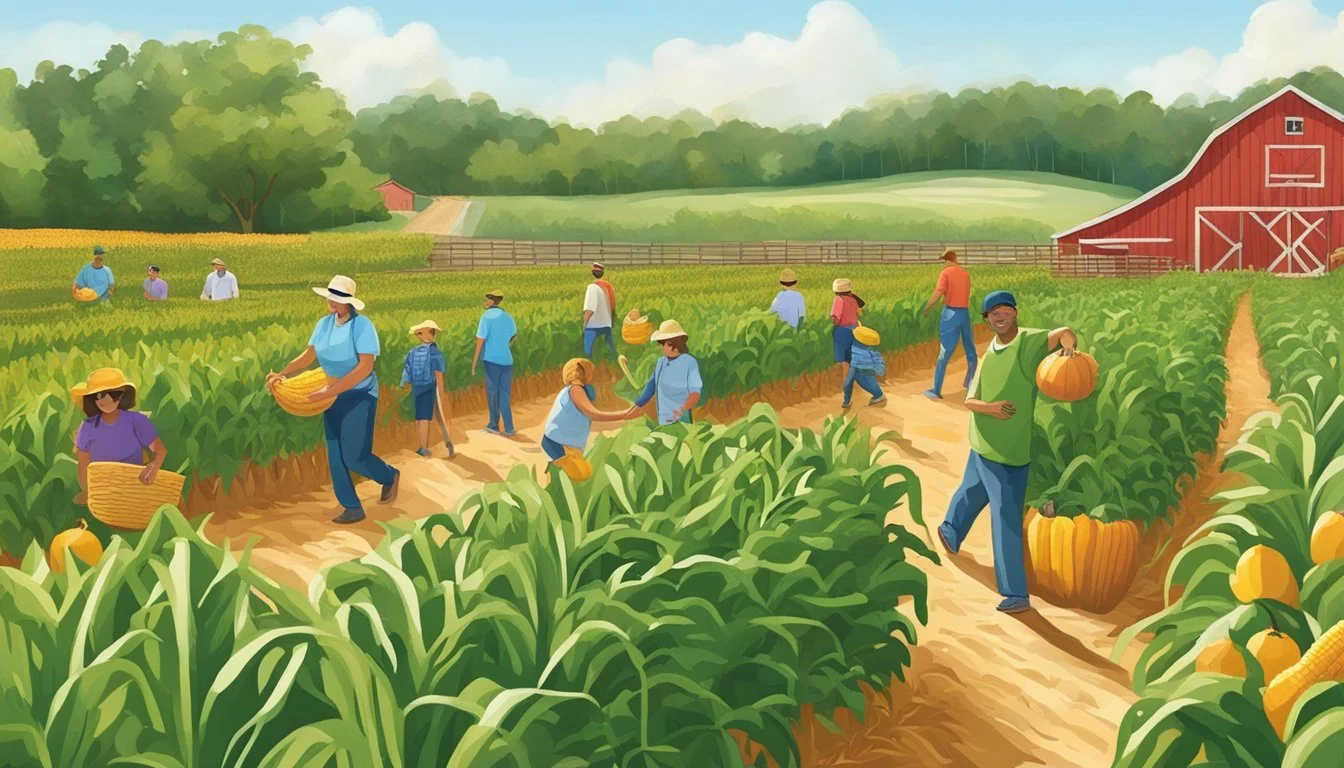Agritourism in Alabama
Exploring the Heart of Dixie's Farm Experiences
Agritourism, a fusion of agriculture and tourism, has found fertile ground in Alabama, presenting a unique way for visitors to connect with the state's deep-rooted agricultural heritage. This growing sector offers a variety of hands-on experiences that invite tourists to partake in authentic farm life. Visitors can engage in activities such as u-pick fruit and vegetable operations, farm tours, and agricultural festivals, which provide both entertainment and education.
Alabama's agritourism ventures punctuate the state’s landscape, ranging from the rolling hills of North Alabama to the fertile plains in the south. They deliver a diverse palette of experiences, allowing travelers to explore working farms, orchards, vineyards, and farmers markets. This immersive form of tourism not only supports local economies but also educates the public on agricultural practices, sustainability, and the origin of their food.
The agritourism industry in Alabama has strategically focused on creating low-cost, high-impact opportunities for operators to maximize revenues while preserving resources. These efforts have resulted in a variety of accessible agritourism operations that cater to a wide audience, providing a platform for farmers to share their stories, practices, and the value of their work with visitors and the larger community.
Understanding Agritourism
Agritourism in Alabama combines traditional agriculture with tourism, providing visitors with a unique opportunity to experience farming life first-hand. It serves as a tool for education and income diversification within rural communities.
History of Agritourism in Alabama
Agritourism has deep roots in Alabama's rural landscape. Initially, it emerged as a response to the fluctuating agricultural economy, allowing farmers to supplement their income by offering activities such as farm tours and on-site produce sales. This transition has gradually integrated educational components, enabling a connection between consumers and the origins of their food.
Agritourism and the Alabama Economy
Income Generation: Agritourism provides multiple streams of revenue for Alabama farm owners. Value-added products and services, including farm stays and outdoor activities, not only increase profits but also contribute to the economic vitality of rural areas.
Economic Impact: The sector bolsters the state economy by creating jobs and promoting spending in local communities. Agritourism's educational aspects, such as school tours, enhance community knowledge about agriculture's role in society.
In summary, agritourism in Alabama is a developing industry that supports agricultural sustainability and rural economic development through diverse visitor experiences.
Key Agritourism Activities and Attractions
Alabama's agritourism scene offers a diverse array of hands-on activities and scenic attractions where visitors can immerse themselves in the state's rich agricultural heritage.
Farm Visits and U-Pick Experiences
Visitors seeking a true farm-to-basket experience can indulge in U-pick opportunities at local farms throughout Alabama. Reeves Peach Farm welcomes guests to gather ripe peaches straight from the branch, while berry enthusiasts can harvest fresh strawberries and blueberries at family-owned patches. These farm visits not only provide a connection to the land but also allow visitors to take home the freshest produce.
Corn Mazes and Pumpkin Patches
Seasonal activities like navigating through intricately designed corn mazes and selecting the perfect pumpkin from a sprawling pumpkin patch are quintessential fall experiences in Alabama. Farms transform into festive destinations offering these attractions along with hayrides and photo opportunities, creating memorable moments for families and groups.
Wineries and Vineyard Tours
Alabama's mild climate nurtures a variety of grapes, allowing wineries to flourish. Vineyard tours provide a glimpse into the winemaking process, from vine to bottle. Visitors can sample local vintages, often paired with stunning views of the surrounding countryside, elevating the tasting experience.
Festivals and Seasonal Events
Throughout the year, Alabama hosts an array of farm festivals and seasonal events that showcase local agriculture and community. Events range from harvest festivals celebrating the bounty of the seasons to agricultural fairs that include livestock displays, cooking demonstrations, and craft markets.
Specialty Farms and Living History Farms
For those interested in unique agricultural experiences, specialty farms like 1818 Farms and Sullivan Creek Ranch offer encounters with farm animals and a look into sustainable farming practices. Living history farms provide an interactive educational experience, depicting farming life in bygone eras through reenactments and authentic demonstrations.
Visitors to Alabama can further explore the agritourism offerings by following the Agriculture Adventures Trail, connecting them to an even wider variety of farm-related attractions and experiences throughout the state.
Agritourism Destinations in Alabama
Alabama’s agritourism destinations offer a blend of interactive farm experiences, from hands-on picking of fresh produce to educational tours and serene farm stays. These attractions allow visitors to connect with the state's agricultural heritage and enjoy the countryside.
Spotlight on North Alabama
In North Alabama, the Agriculture Adventures Trail beckons visitors with a variety of hands-on farms and orchards. Tourists can engage in activities such as farm-to-table dining, visiting local vineyards & wineries, and navigating through corn mazes. Those seeking a more immersive experience can download the Trail Guide to plan a comprehensive tour of North Alabama’s agritourism offerings.
Family-Friendly Agritourism Spots
For families, Alabama presents numerous petting zoos and U-pick farms where children and adults alike can pick their own fruits like strawberries and blueberries. Seasonal activities such as pumpkin patches and farm festivals are also popular, fostering a fun environment that is both educational and entertaining for all ages.
Rural Retreats and Farm Stay Experiences
Travelers looking for a peaceful getaway can find solace in Alabama’s rural retreats and farm stay experiences. Options range from cozy bed and breakfasts to working farms where guests can participate in daily farm activities. Staying at an agritourism destination allows for a deeper understanding of farm life and often includes the enjoyment of fresh, home-grown produce.
Economic Benefits and Challenges
Agritourism in Alabama has become an instrumental avenue for revenue generation and socio-economic development, offering farmers a way to supplement their income while posing unique challenges in marketing and public relations.
Agritourism Revenue and Local Impact
Agritourism has made significant inroads into Alabama's economy, with an estimated traveler expenditure of $22.4 billion in 2022. This sector not only bolsters local economies by diversifying farmers' income streams but also enhances revenue in rural communities, often facing economic difficulties. Agritourism connects consumers directly to agricultural experiences, contributing to both preservation of the state's agricultural heritage and economic sustainability of rural areas.
Direct Economic Benefits:
Revenue Generation: Agritourism adds to the income of Alabama's farm operators.
Community Impact: Injects money into rural economies, stimulating local businesses.
Indirect Economic Benefits:
Promotion of open land and wildlife protection.
Improvement of water quality through sustainable tourism practices.
Yet, it's critical to note the resource-intensive nature of certain agritourism activities, which can impose financial strain. Balancing cost with visitor satisfaction and resources emerges as a challenge for operators.
Marketing and Public Relations
Agritourism in Alabama demands effective marketing to harness its full potential and to thrive. Educational resources geared toward agritourism operators often emphasize high-leverage, low-input strategies for maximizing income and resources. In addition, the agritourism sector requires engagement in specific marketing and public relations (PR) efforts to elevate its visibility and attract visitors.
Strategic Marketing Efforts:
Development of engaging experiences tailored to diverse visitor interests.
Utilization of both digital and traditional platforms to promote agritourism offerings.
Public Relations Focus:
Reputation building within and outside the local communities.
Foster relationships with media to generate positive coverage and attention to agritourism ventures.
Understanding and navigating the legislation pertinent to agritourism is crucial for both marketing success and regulatory compliance. Operators need to communicate their businesses effectively, not only to attract visitors but also to handle the scrutiny of regulatory frameworks.
Educational Impact and Community Engagement
Agritourism in Alabama serves not only as a means for economic development but also plays a crucial role in educational enhancement and community engagement. It provides a platform for the Alabama Cooperative Extension System and educational institutions like Auburn University to impart knowledge and engage with communities.
Cooperative Extension System's Role
The Alabama Cooperative Extension System, affiliated with Auburn University, operates as a key educational resource for agritourism. They facilitate the development of agritourism operations by providing training and assistance to farmers and operators. Workshops and resources are focused on high-leverage, low input strategies that benefit operators by maximizing income and resource efficacy. The Extension System also sheds light on legislation relevant to agritourism, offering a strategic advantage to local communities in navigating legal frameworks.
Connecting with the Younger Generation
Agritourism actively involves the younger generation by providing real-life educational experiences and connecting them with agricultural practices. Initiatives like farm visits and youth programs foster a hands-on learning environment where children and young adults can gain a deeper appreciation for agriculture. This engagement helps inculcate a sense of responsibility towards the environment and local economies, ensuring a vested interest in agritourism's sustainability.
Sustainability and Agricultural Diversity
In Alabama, the agritourism sector intertwines sustainability with agricultural diversity. Farmers capitalize on the state's rich agricultural heritage while incorporating practices that ensure long-term ecological balance.
Diversification of Farming Practices
Alabama's farmers are increasingly adopting diversified farming practices to achieve sustainability. They are extending beyond traditional cash crops like cotton, engaging in the cultivation of soybeans and wheat. This diversification not only reduces the risk associated with single-crop dependency but also contributes to soil health. Here are some specific practices:
Crop rotation: Alternating crops like soybeans, wheat, and cotton to enhance soil fertility.
Intercropping: Planting complementary crops together to optimize space and reduce pests.
Preservation and Innovation
Alabama's agriculture is striking a balance between preservation of traditional methods and innovation in sustainability:
Heritage Techniques: Utilizing age-old farming techniques that have proven environmentally friendly over successive generations.
Technological Advancements: Implementing cutting-edge irrigation strategies and sustainable farming equipment to lower costs and improve productivity.
Agritourism in Alabama not only showcases these methods but also educates visitors on the importance of sustainability and diversity in agriculture.
Agritourism Legislation and Compliance
In Alabama, legislation safeguards agritourism providers, delineating clear frameworks for operation, visitor safety, and income generation. These laws are crucial for farmers looking to diversify their revenue streams through agritourism activities.
State Regulations and Policies
Alabama's approach to agritourism is informed by specific legislation, aimed at balancing the expansion of tourism with the safety and liability concerns of agricultural operations. Under Alabama Code § 6-5-347, agritourism is defined and regulated, providing a structure within which farmers can offer tourism-related activities. This statute includes provisions on definitions, responsibilities, and exemptions.
Central to the state's regulations is the need for agritourism professionals to comply with posted signage requirements, ensuring that visitors are aware of the inherent risks of agritourism activities. These signs serve as a form of risk communication and legal defense, articulating the limits of liability that a farm owner carries in the event of an accident or injury.
The growth in agritourism operations, as evidenced by the U.S. Census of Agriculture, underscores the importance of such legislation in fostering a supportive environment for farmers to secure additional income through diverse activities.
Insurance and Liability
Liability and insurance are critical aspects of agritourism that directly impact both the legal and operational landscapes. Farmers must navigate these with diligence, as they affect the viability of agritourism enterprises.
In Alabama, the agritourism liability laws serve to reduce the risk to owners by limiting their liability concerning injuries or deaths that may occur due to the inherent risks of agritourism. These limitations are contingent upon the agritourism professional's compliance with the law, especially regarding the aforementioned warning signs.
Insurance requirements are also part of the operational concerns for an agritourism business. Farmers must secure appropriate levels of insurance to protect themselves and their operations. This is often a condition for legal compliance and may affect the types of activities that can be safely offered.
The intersection of insurance and legislation, therefore, is a pivotal focus for Alabama's farming community, as it supports the pursuit of agritourism as a feasible and protected method of boosting farm income.
Planning Your Agritourism Visit
A successful agritourism visit to Alabama hinges on timing and preparation. By choosing the ideal season and equipping oneself properly, visitors can fully immerse in the farm life experiences that Alabama offers.
Best Time to Visit
Alabama's agritourism varies by season, giving visitors different experiences throughout the year.
Fall: It's harvest time, perfect for pumpkin picking, corn mazes, and fall festivals. This is one of the most popular times to visit, so plan accordingly.
Summer: Berries ripen and flowers bloom. U-pick farms are a summer delight and a great way for families to engage with local agriculture.
Preparing for the Trip
Preparation maximizes the enjoyment and smoothness of one's trip. Here's how visitors can prepare:
Research: Look into specific agritourism sites to learn about their offerings and any necessary reservations.
Purchase: Buy tickets in advance if required, especially for popular events or activities.
Clothing: Dress according to the season and activity. Comfortable footwear is essential for farm walks.
Accommodation: If planning an extended stay, consider booking farm stays or bed-and-breakfasts early.
Remember to check each farm's rules and available facilities before visiting.
Supporting Local through Agritourism
Agritourism in Alabama bolsters the local food movement by creating a robust connection between consumers and the source of their food. This immersive agricultural experience inspires appreciation for the state's rich farming traditions and amplifies local economic growth.
Farm-to-Table Dining
Many agritourism destinations intertwine with farm-to-table restaurants. These eateries source ingredients directly from the farms visitors explore, ensuring the freshest dining experiences. They showcase seasonal produce and made-on-the-farm products, solidifying the farm-to-fork ethos.
Farmers Markets and Made-on-the-Farm Products
Local markets provide farmers with a venue to present their harvest and artisanal goods. Visitors can peruse a variety of stands offering everything from fresh fruits and vegetables to homemade jams and cheeses. These markets are integral in supporting the livelihoods of local producers.
Local Engagement:
Encourages local spending
Promotes sustainable practices
Strengthens community relationships
Agritourism Destinations
Travelers are enticed to rural areas through a network of agritourism sites. They contribute to the preservation of agricultural lands and offer interactive experiences such as:
U-pick orchards and gardens
Educational farm tours
On-farm product demonstrations
These attractions serve as pillars for the agritourism industry, enhancing the visibility of Alabama’s agricultural heritage and reinforcing a cycle of local patronage. By participating in agritourism, consumers play a direct role in nurturing the local economy and preserving the state's farming culture.
Future of Agritourism in Alabama
The agritourism sector in Alabama is poised for expansion, building on a blend of educational, recreational, and hospitality activities. By leveraging its thriving agricultural scene, Alabama is set to meet the rising demand for rural experiences.
Trends and Growth Opportunities
Economic Development: The agritourism industry in Alabama presents an opportunity for significant economic growth. Analysts see a bright future as farmers diversify into agritourism, thereby creating new revenue streams. The state's tourism department works closely with tourism specialists to capitalize on this trend, ensuring a supportive environment for agritourism entrepreneurs.
Educational Experiences: Alabama agritourism has emphasized educational elements, such as school tours, which are expected to grow further. This aligns with the future trajectory where agricultural sites become hands-on educational spaces, promoting sustainable practices and farm-to-table experiences.
Enriched Guest Experiences: The trend towards providing varied and immersive experiences through farm stays, on-farm dinners, and outdoor activities like festivals showcases the potential for agritourism to enrich Alabama's tourism offerings. Hospitality anchors these experiences, promising guests authentic interactions with the agricultural lifestyle.
Support and Innovation: There are significant growth opportunities in developing innovative agritourism offerings to appeal to new market segments. The Alabama Agribusiness Council and other assistance groups support these efforts through various initiatives designed to strengthen the state's agritourism framework and drive innovation in this sector.











